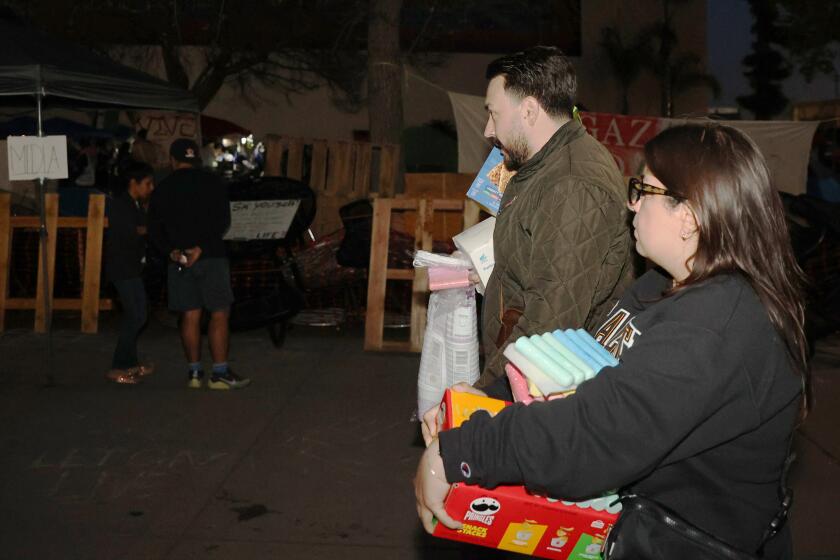Vote nears for ID card plan in S.F.
The Board of Supervisors in this famously liberal enclave is expected to give final approval Tuesday to an ordinance that would be controversial nearly anywhere but here.
Only one other American city -- tiny New Haven, Conn., with just one-sixth the population -- has taken such a bold step: mandating that identification cards be made available to all local residents whether they are in the country legally or not.
Big news, right?
Not really. In a city that has turned municipal foreign policy into well-nigh a civic art form, this latest initiative never even cracked Page 1 of the local newspaper.
And why should it, when you consider all that came before, here in a place that seems to channel Vatican City, an actual sovereign city-state whose reach far belies its size:
In 2004, voters overwhelmingly approved Proposition H, which demanded the withdrawal of all U.S. troops from Iraq. The next year, voters said yes to Proposition I, which opposed military recruitment in public schools.
A year ago, they voted to impeach President Bush and Vice President Cheney. As the San Francisco Chronicle noted in a recent editorial, “it’s hardly worth getting outraged when San Francisco supervisors load the ballot with measures of more symbolism than substance. It’s what they do.”
Political scientist Richard DeLeon, who is writing a book about local politics -- titled, appropriately, “Vanguard City” -- said “people here trip over each other to be the trailblazer.”
But it’s not simply about being first, being outrageous or exhibiting hubris when the Board of Supervisors makes the city a nuclear-free zone or passes sanctions against Burma, also known as Myanmar, or demands that the president condemn the genocide in Darfur.
The way Supervisor Tom Ammiano sees it, “we are a global society and things are connected. When municipalities weigh in on Burma or other international issues, we’re not ignoring the local. We are fully capable of multitasking.”
Besides, he said, he’s “never bought the argument that it’s outside of our sphere of influence.”
But then again, he wouldn’t. Ammiano sponsored the Burma resolution and is the driving force behind the municipal identification cards.
The genesis of this latest measure -- which Mayor Gavin Newsom is expected to sign once it reaches his desk after Tuesday’s vote -- is a 1989 ordinance that declared San Francisco an immigration sanctuary.
What that means, said Newsom spokesman David Miree, is that “no city funds will be used or any types of direction given to city workers to aid in the immigration raid process.”
The ID card measure, which Ammiano introduced in September, takes the idea of sanctuary a step further, giving undocumented immigrants and others who live on the edges of society a way to gain easier access to city and business services and prove residency.
All city departments and companies with city contracts would be required to accept the card as valid proof of identification and residency, unless state or federal law requires other documentation.
Ammiano said the city has been working with local banks so that the cards can be used to open accounts, and they have been “very sympathetic.” He also expects that having such government identification will make undocumented residents more likely to report crimes they witness or experience.
“We just feel, particularly on the economic front, that without the hard work of a lot of people who are residents but not citizens, we wouldn’t have a successful tourism or hotel industry,” Ammiano said. If undocumented immigrants “have to live in the shadows or are made invisible, then that affects all of us.”
Angelica Salas, executive director of the Coalition for Humane Immigrant Rights of Los Angeles, called the ID measure a “fabulous idea.” Though its scope would be limited, she said, it’s really “about recognition . . . that there are actually people who live and work in that city who should not be ignored.”
But Ira Mehlman, spokesman for the Federation for American Immigration Reform, said the ID cards and San Francisco’s stance toward federal immigration law in general have potentially dangerous consequences.
“Nobody says the city of San Francisco has to enforce the laws, but their minimal obligation should be not to impede the enforcement of federal immigration law,” he said.
On the other hand, “if it was Dubuque, Iowa, doing this, it might raise a few eyebrows. But in San Francisco, people just say it’s San Francisco being San Francisco.”
More to Read
Start your day right
Sign up for Essential California for news, features and recommendations from the L.A. Times and beyond in your inbox six days a week.
You may occasionally receive promotional content from the Los Angeles Times.







